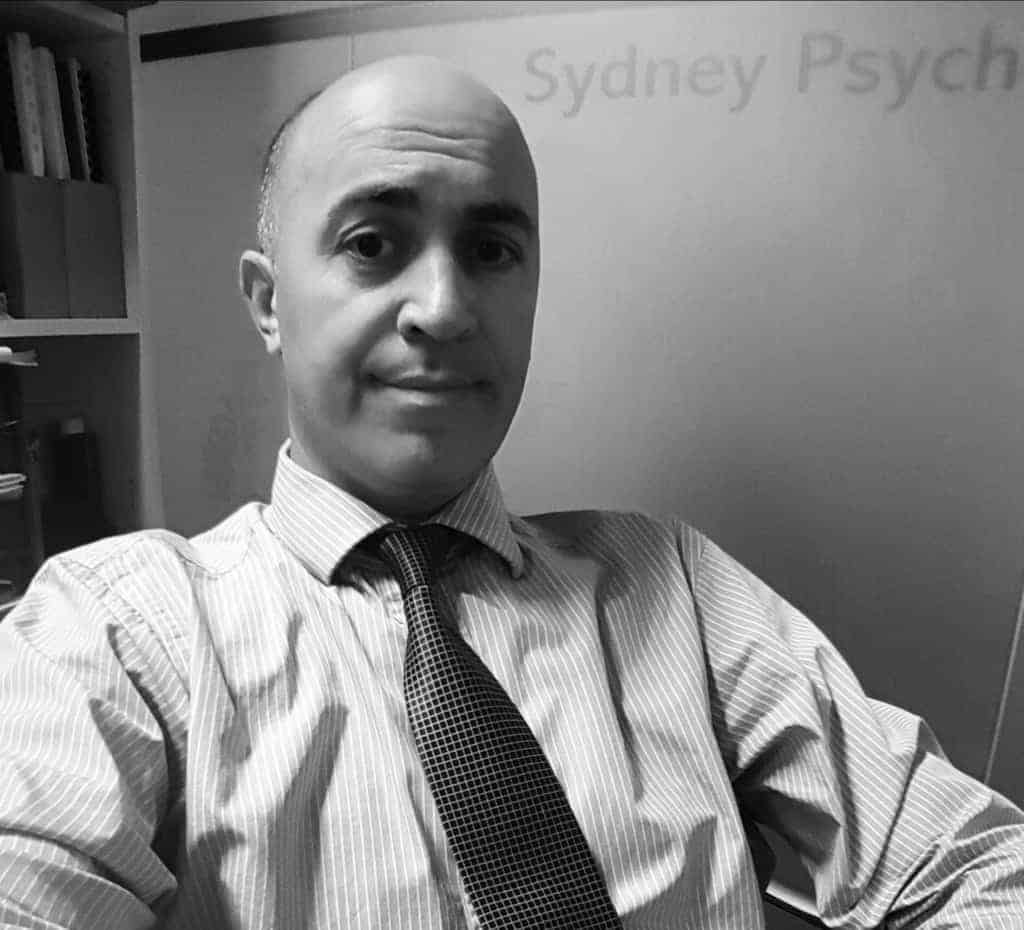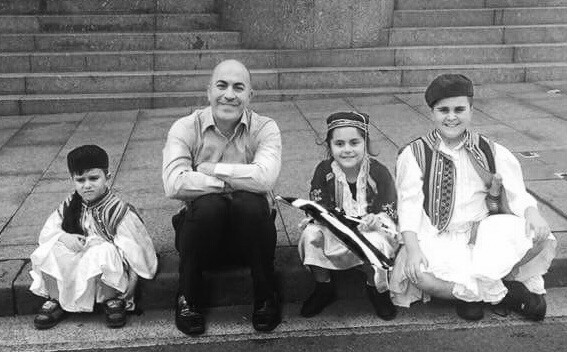Pan Tsomis is a much sought-after psychologist based in Sydney, with a breadth of experience and expertise, ranging from running his private practice as a clinical psychologist, spending years working as a forensic psychologist and working in prisons. He has completed a Master of Criminology.

Tsomis has been consulted to assist with tragic events including the East Timor Peacekeeping, the Lindt Café siege in Sydney, and the recent Bourke Street road tragedy in Melbourne. Passionate about his family, helping people through hardship, and with a sense of humour well and truly in tact, GCT recently had a chat to Pan about all things psychology.

Where were you born and raised, and what part of Greece is your family from?
I was born in Athens, Greece, and arrived in Sydney on the “Patris” in May 1971, at the age of 1 years old. My mum is from Iliokomi, in Serres, Macedonia, at the foot of a huge mountain called “Pangaio”. Dad is from northern Peloponissos, Aigio, a little coastal town, but the family had a home there for the winter, and lived in Plataniotissa, further up in the mountains, near Kalavryta. My parents met and married in Stuttgart, in Germany and lived there for 9 years. My older brother was born there too.
What ignited your interest in psychology? Were you the type of child who was switched on to people's behaviours and emotions or did that come later on?
I was actually hoping to be a pilot, or a veterinary surgeon, but after work experience at a veterinary surgery I felt depressed at how animals were suffering, so I looked in to psychology! Being switched on to people’s behaviours and emotions definitely came much later on. I was a totally stereotypical boy with no idea about anything else except fast cars, aeroplanes and most sports.
Tell us a bit about the journey your career has taken- from starting out as a psychologist to delving into criminology?
After graduating as a psychologist at Sydney University I started off working in the Mental Health Team in Port Macquarie, and eventually as a child and adolescent psychologist. One of my first jobs was in the NSW Department of Juvenile Justice. After several years there I studied at university while working full time and completed the Master of Criminology degree at the Sydney University Law School.
A year later I was working at the Department of Veterans’ Affairs with combat veterans and their families, dealing mostly with post-traumatic stress disorder. I worked as a school counsellor at All Saints Grammar and also at the St. George Mental Health Team before going into private practice.
I have been in private practice since 1998, initially as a forensic psychologist. I spent the next 10 or so years assessing violent offenders in prisons, giving evidence in court and treating offenders in the community.
After this, I started taking on more work as a clinical psychologist, which is what I primarily do today. I also supervise several psychologists and teach at universities and hospitals as a consultant.
What do you love the most about your job?
Being able to assist people at the most difficult times of their lives, being trusted, seeing (on a daily basis) how strong, resilient and tough people are.
What have been some of the biggest challenges you have encountered in your line of work?
There have been “serious events” I’ve been involved in and “big challenges” in my work. Serious events I’ve been involved in include the East Timor Peacekeeping in 1999, Glenbrook Train Disaster in 1999, Waterfall Train Disaster in 2003, the Lindt Cafe Siege in 2014, the police shooting in Parramatta in 2015 and more recently the Bourke Street tragedy in Melbourne in January 2017.
Big challenges include working with parents that have had children dying from cancer or other illness, working with victims of serious violence (or sexual assaults), working with police officers and soldiers that have witnessed serious trauma, working with couples going through separation, working with serious offenders including those on Parole after spending years in prison for murder, pedophiles, other violent offenders and very young offenders.
What have been some of the highlights?
The ongoing success stories are my highlights. When a 34 year old mother with post-natal depression says, after 3 sessions, that she feels much more confident, able to “feel in control” with her 6 weeks old baby.
When a police officer that witnessed a deceased person in a motor vehicle accident is able to get back into her car and drive, work normally and continue in her line of work.
When a soldier who was been having panic attacks walking through shopping centres can take his wife out to dinner and enjoy the evening without anxiety.
When an ex-prisoner completes 2 years of a Parole Order and has managed to secure work, developed relationships with family members and peers, lead a lifestyle free from offending behaviour and is contributing to the community.
When a hostage from the Lindt Cafe can sit in a cafe and have lunch for up to an hour without overwhelming fear.
When a Vietnam veteran explains that he was able to sleep for 6 straight hours for the first time in 47 years, and now has a much closer and caring relationship with his wife than ever before.
What inspires you?
So many things inspire me. My clients inspire me. My parents and my family inspire me. My faith in God, in people, in community and the love that people share inspires me. I see inspiration just about anywhere I look these days!
Tell us about your experience working in prisons? What attributes are most needed as a psychologist in this environment?
In prisons I primarily conducted risk assessments. I envisaged an environment where I was doing therapy and was helping clients, but due to the enormity of the workload, prison psychologists are usually used in a reactive role (assessing danger or suicide risk) rather than a proactive role (group therapy and counselling).
Psychologists need to have good insight into their own issues, triggers and weaknesses, as prisoners will very soon figure them out and attempt to use them against you. Psychologists need to be, and end up being very assertive.
How do you switch off at the end of the day from all you have seen and heard?
I use distraction techniques often! I race motorbikes, I jog, I teach Sunday School, I train in martial arts, I wrestle with my kids, I wrestle with my wife (!!) and generally try to be a “normal person”, so I don’t get consumed by the difficult stories and situations I have presented to me each day.
Comparing the statistics on mental health today with 10 -15 years ago, it appears more and more people are battling various mental health issues. From your experiences, what do you make of this?
It is an interesting question and I have two theories.
- We have become much more aware of mental health issues, hence, even though the prevalence may be the same, it may seem like it is happening more.
- Society has changed. People have higher expectations of “everything will be alright”, and hence we end up more depressed and anxious when things go wrong. Anecdotally, back in 1905, if you had 7 children, you may have expected at least 2 to die before the age of 10, your parents did not live past 60 and we didn’t have TV, smart phones and Facebook showing us how lovely the world is and how good life is for others.
Is there anything taking place in your field in the near future that you are particularly excited about?
Yes, there is neuropsychological research happening all the time that looks into how therapeutic interventions impact on brain structure and processing. There are also numerous social psychology experiments that are helping us better understand human behaviours.
Have you been back to Greece? Do you feel like you have two 'patrides?'
After coming to Sydney when I was 1 years old, I returned to Greece with my family “for good” when I was 9 years old. We lived there for 2 years and I went to mainstream school, then came back to Sydney from Year 6 onwards. I went back in 2001, two years after I was married, and spent 7 weeks there with my wife. We basically visited all our relatives.
We went back with two kids in 2010 for 4 weeks (our kids were 6 years old and 2 years old at the time), and also went back in 2014 for 5 days with our 3 kids (10, 6 and nearly 2 at the time). We only stayed 5 days, but subsequently spent a month in Italy.
Come to think of it, I went in 2008 too. This was an odd trip - my mother had suffered from dementia, here in Sydney, and passed away in 2008. Dad had insisted we bury her in Greece, so, along with my dad and older brother, we flew there for a day, had a funeral, burial, and I flew back to Sydney a day later.
What has been one piece of advice you have received along the way that influenced you?
One piece? Oh, there’s so much that has bounced around in my head over the years!
- It’s not my will that matters ultimately. It is God’s will
- If you want to make the world a better place take a look at yourself and make a change (yeh, it’s a Michael Jackson quote!)
- You pay to enjoy your food, not to finish your food
- If someone pays you $10, do at least $11 worth of work
- Nothing changes unless you change something
What is one of the most common pieces of advice you find yourself giving to people?
Don’t give up.
What do you think are some of the key factors for good mental health?
I believe there are static (fixed, uncontrollable) and dynamic (fluid, changing) factors. If you manage to sleep well, have a good appetite, are in good physical health, have good community/family support, remain socially connected, practice impulse control (emotional stability) and don’t avoid stuff, you’ll probably be pretty set! There are more however, and most interact and influence with each other.
What is your favourite Greek food?
I love gemista or pastitsio, equally, but it has to be my wife’s because she’s the best!

